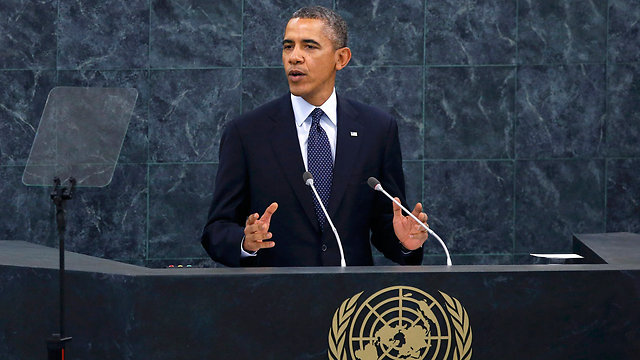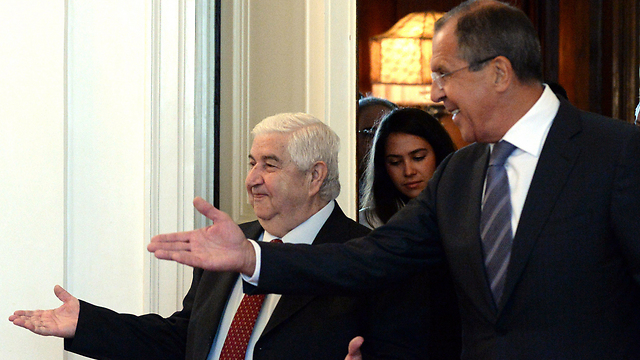
The UN Security Council is set to adopt a resolution on Friday on eradicating Syria's chemical arsenal after Russia and the United States overcame a bitter deadlock to avert US military action against Syrian President Bashar Assad's government.
President Barack Obama said on Friday that the draft resolution is "a potentially huge victory for the international community."
Related stories:
- Lavrov on Syria: It's a chance for solution
- Hezbollah gambles all in Syria
- UN investigates more Syrian chemical arms use
Obama said the agreement was something the United States had long sought and likely would not have been achieved without a credible threat of US force after the chemical weapons attack on a suburb of Damascus on Aug. 21 that killed scores of Syrian civilians, including children.
Obama at the UN (Photo: AP)
"I think rightly, people have been concerned about whether Syria will follow through on the commitments that have been laid forth, and I think there are legitimate concerns as to how technically we are going to
be getting those chemical weapons out while there is still fighting going on," Obama said.
"Nevertheless, this represents potentially a significant step forward," he added.
On the opposing side, Syrian Foreign Minister Walid al-Moallem said his country is determined to promote the destruction of its chemical arsenal. In an interview to Al-Jazeera, al-Moallem expressed his hope that the UNSC will pave the way toward an agreement which will lead the warring Syrian sides to the negotiation table.
Syrian FM al-Moallem with Russia's Lavrov (Photo: AFP)
Resolution imminent
The five big UN powers ended weeks of diplomatic deadlock on Thursday by agreeing a draft Security Council resolution - based on a deal reached by Moscow and Washington earlier this month - that demands Syria give up its chemical weapons.
UN diplomats said the full 15-member Security Council was expected to vote on the resolution at 8 PM (12 pm GMT) on Friday. It will also be the first time the council formally endorses a plan for a political transition in Syria agreed at an international conference in Geneva in June 2012.
Western powers on the Security Council conceded they had backed away from many of their initial demands during negotiations. Russian Deputy Foreign Minister Sergei Ryabkov claimed a victory, saying Moscow had stood its ground on the issue of the threat of military force to strengthen the resolution.
A major sticking point had been Russia's opposition to writing the resolution under Chapter 7 of the UN charter, which covers the its authority to enforce its decisions with measures such as sanctions or military force.
The compromise draft resolution makes the measure legally binding, but provides for no means of automatic enforcement if Syria fails to comply, as the United States, Britain and France had originally wanted.
In an interview for the CBS network Kerry confirmed that the US indeed gave up the clause of automatic military action against Syria, to prevent a Russian veto. But he clarified that the US reserves the right to strike against Syria, should it not keep its obligation to give up its chemical weapons stockpiles.
Russia also announced lately that it would be willing to secure the Syrian sites related to the chemical weapons program while the stockpiles are destroyed.
the Washington Post reported on Friday that US and Russian officials believe the vast majority of Syria’s nerve agent stockpile consists of “unweaponized” liquid precursors that could be neutralized relatively quickly, lowering the risk that the toxins could be hidden away by the regime or stolen by terrorists.
The report said a confidential assessment by the United States and Russia also concludes that Syria’s entire arsenal could be destroyed in about nine months, assuming that the regime in Damascus honors promises to cede control of the chemical assets to international inspectors.
Yitzhak Benhorin contributed to this report
- Receive Ynetnews updates
directly to your desktop

















